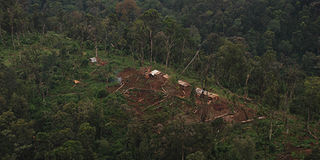No compensation for Mau settlers

A settlement within the Mau Forest Complex. Photo/FILE
Illegal settlers evicted from the South Western Mau Complex in 2009 will neither be resettled nor compensated, according to the Interim Coordinating Secretariat responsible for reclaiming the water tower.
In a brief presented to Prime Minister Raila Odinga last month, the secretariat says compensating such people will create a precedent that would encourage others to invade government land.
This could provide a basis for squatters who have been relocated from forests, road reserves and national reserves in the past to make a claim for compensation,” says the report submitted three weeks ago.
It adds that even though the government had made efforts to assist the squatters restart their lives, they were being incited not to return to their original homes.
This recommendation by the Noor Hassan Noor-led secretariat contradicts other government agencies, including the Ministry of Special Programmes, which has promised that the estimated 6,000 evictees spread over nine camps will be resettled.
The developments come at a time when the Prime Minister has picked a five-man team to oversee the management of the newly gazetted Water Towers Conservation Funds expected to stop an impending environmental crisis.
On Wednesday, Livestock Development minister Mohamed Kuti said Kenyans in arid lands risked losing six million head of cattle, 16 million sheep and goats and 150,000 camels to an unfolding drought, which has partly been blamed on environmental degradation.
The new team to be led by Prof Fredrick Owino, chairman of the East African Wildlife Society, has a strong bias towards attracting international donors with members drawn from the Finish and the Italian embassies. Another notable fund raiser also in the team is Mr Colin Church of the Aberdare fence project.
The secretariat says it completed the repossession of 19,000 hectares mainly in the South Western Mau Forest Reserve in the first week of November, but it is being accused of developing cold feet and running behind its timetable.
“While the third phase of the restoration targeting Maasai Mau should have been executed 10 months ago, our spot check indicates that the survey has not been completed despite repeated assurances to the contrary,” Mr Jackson ole Kamoye, chairman of the Friends of Mau Conservation lobby group, told the Nation.
A spot check by the Nation this week found settlers going on with normal farming activities in the forest.




